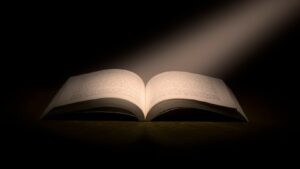Examples of Book Genres
- Diverse Genres: Literature is categorized into various genres, including fiction, non-fiction, poetry, and drama, each offering unique perspectives and experiences for readers.
- Fiction Exploration: Key fiction genres such as literary fiction, historical fiction, science fiction, and fantasy enable readers to engage with complex themes and imaginative narratives.
- Non-Fiction Insights: Non-fiction genres, including biography, self-help, true crime, and travel writing, provide factual accounts and practical guidance, enriching readers’ understanding of the world and themselves.
- Poetry Forms: Poetry encompasses genres like narrative, lyric, and epic poetry, each using structured language to evoke emotions and tell profound stories.
- Dramatic Expressions: Drama genres such as tragedy, comedy, and musical theatre explore the spectrum of human experiences, utilizing performance and storytelling to provoke thought and entertain.
 Books are a gateway to countless worlds, ideas, and emotions, and the genre often shapes a reader’s experience. From the thrill of a gripping mystery to the heartwarming tales of romance, each genre offers a unique lens through which stories unfold. Understanding the various book genres can enhance a reader’s journey and help them discover new favorites.
Books are a gateway to countless worlds, ideas, and emotions, and the genre often shapes a reader’s experience. From the thrill of a gripping mystery to the heartwarming tales of romance, each genre offers a unique lens through which stories unfold. Understanding the various book genres can enhance a reader’s journey and help them discover new favorites.
With so many genres to explore, it’s easy to find something that resonates with personal tastes. Whether one prefers the imaginative realms of fantasy or the thought-provoking narratives of literary fiction, the diversity in book genres ensures that there’s something for everyone. This exploration of examples will illuminate the rich tapestry of literature and inspire readers to dive into new adventures.
Fiction Genres
Fiction genres encompass various categories that explore different themes and narratives, appealing to a wide range of readers. The following sections detail specific fiction genres and their characteristics.
Literary Fiction
Literary fiction focuses on character development, thematic depth, and stylistic quality. It often addresses complex social and human issues. Notable examples include works by authors such as Toni Morrison and Kazuo Ishiguro, who delve into personal and cultural narratives with rich, nuanced prose.
Historical Fiction
Historical fiction combines imaginative storytelling with historical events, creating narratives set in past eras. These tales feature real figures or events, offering readers insights into historical contexts. Examples include “The Book Thief” by Markus Zusak, set in World War II, and “All the Light We Cannot See” by Anthony Doerr, which illustrates life during the German occupation of France.
Science Fiction
Science fiction explores futuristic concepts, advanced technologies, and alternative realities. It raises questions about humanity’s future and ethical implications of technological advancements. Renowned examples include “Dune” by Frank Herbert and “Neuromancer” by William Gibson, both of which present immersive worlds and thought-provoking scenarios regarding society and technology.
Fantasy
Fantasy genres create imaginative worlds with magic, mythical creatures, and extraordinary adventures. These narratives often involve epic quests and battles between good and evil. Popular examples include J.R.R. Tolkien’s “The Lord of the Rings” and J.K. Rowling’s “Harry Potter” series, where readers experience compelling mythologies and richly developed universes.
Non-Fiction Genres
Non-fiction genres present factual accounts and experiences that enrich readers’ knowledge. These genres span diverse topics, each with distinct characteristics and purposes.
Biography
Biography features the life stories of individuals, providing insights into their experiences, achievements, and influences. This genre documents significant historical figures like Albert Einstein and contemporary icons such as Michelle Obama. Biographies often explore personal challenges, societal impacts, and the motivations behind notable actions, making them relatable and inspiring.
Self-Help
Self-help literature aims to empower readers by offering practical advice and strategies for personal improvement. This genre covers diverse topics, including mental health, relationships, and productivity. Popular examples include “The 7 Habits of Highly Effective People” by Stephen Covey and “Atomic Habits” by James Clear. Self-help books encourage readers to take actionable steps towards their goals and enhance their well-being.
True Crime
True crime delves into real criminal cases, analyzing the motives, psychology, and consequences of crime. This genre captures readers’ fascination with criminal behavior and legal proceedings, often featuring notorious cases like the JonBenét Ramsey investigation or the life of Jeffrey Dahmer. True crime works provide an engaging mix of storytelling and factual analysis, often exploring broader societal implications.
Travel Writing
Travel writing transports readers to various destinations, focusing on the unique experiences and cultures encountered by the author. This genre combines narrative storytelling with descriptive imagery, offering insights into geography, history, and local customs. Noteworthy examples include “A Walk in the Woods” by Bill Bryson and “The Geography of Bliss” by Eric Weiner. Travel writing inspires exploration and invites readers to appreciate diverse perspectives from around the world.
Poetry Genres
Poetry genres encompass a variety of forms that express emotions, ideas, and stories through structured language. Each genre possesses distinct characteristics that contribute to its unique impact on readers.
Narrative Poetry
Narrative poetry tells a story through verse, often featuring characters, a plot, and a specific setting. This genre blends the elements of storytelling with poetic devices, creating an engaging experience. Famous examples include “The Raven” by Edgar Allan Poe and “The Iliad” by Homer, both of which showcase intricate plots and compelling narratives within their verses.
Lyric Poetry
Lyric poetry focuses on personal emotions and thoughts, expressing feelings rather than narrating a story. This genre often employs musicality and rhythm, enhancing the emotional resonance. Poems such as “Sonnet 18” by William Shakespeare or “I Wandered Lonely as a Cloud” by William Wordsworth exemplify the beauty and depth of lyric poetry, capturing fleeting moments of introspection and emotion.
Epic Poetry
Epic poetry presents grand tales of heroism and adventure, often celebrating cultural values and historical events. These lengthy narratives typically feature a heroic protagonist facing challenges. Classic examples include “The Odyssey” by Homer and “Paradise Lost” by John Milton, both of which provide insight into the human experience through monumental themes of struggle and triumph.
Drama Genres
Drama genres capture the complexities of human emotions and experiences through various narrative styles. These genres include tragedy, comedy, and musical theatre, each offering unique perspectives on life.
Tragedy
Tragedy explores profound themes like suffering, morality, and fate. It highlights characters confronted with severe challenges and often leads to a devastating outcome. Notable works in this genre include “Hamlet” by William Shakespeare, which delves into the consequences of revenge and existential anguish, and “Death of a Salesman” by Arthur Miller, illustrating the disillusionment of the American Dream. Tragedy encourages readers to reflect on the human condition and the fragility of life.
Comedy
Comedy provides entertainment through humor and satire, often addressing societal norms and human follies. This genre emphasizes light-hearted situations, misunderstandings, and character quirks, leading to eventual resolutions. Notable examples include “A Midsummer Night’s Dream” by William Shakespeare, which intertwines love, confusion, and magic, and “The Importance of Being Earnest” by Oscar Wilde, critiquing Victorian society’s pretensions. Comedy fosters laughter while encouraging audiences to consider deeper truths about human nature.
Musical Theatre
 Musical theatre combines drama with music and dance, creating dynamic storytelling experiences. This genre often tells engaging narratives through memorable songs and choreographed performances. Renowned works include “Hamilton,” which reimagines American history through hip-hop, and “Les Misérables,” highlighting themes of justice and redemption through powerful melodies. Musical theatre captivates audiences by blending emotional storytelling with the artistry of performance.
Musical theatre combines drama with music and dance, creating dynamic storytelling experiences. This genre often tells engaging narratives through memorable songs and choreographed performances. Renowned works include “Hamilton,” which reimagines American history through hip-hop, and “Les Misérables,” highlighting themes of justice and redemption through powerful melodies. Musical theatre captivates audiences by blending emotional storytelling with the artistry of performance.
Endless Possibilities for Readers
Exploring the world of book genres opens up endless possibilities for readers. Each genre offers a distinct lens through which to experience stories and emotions. Whether diving into the intricate depths of literary fiction or embarking on fantastical adventures in fantasy, readers can find something that resonates with them.
The diversity of genres ensures that there’s always something new to discover. From gripping mysteries to enlightening non-fiction, literature has a genre for every interest and mood. Embracing this variety not only enriches the reading experience but also fosters a deeper appreciation for the art of storytelling.



